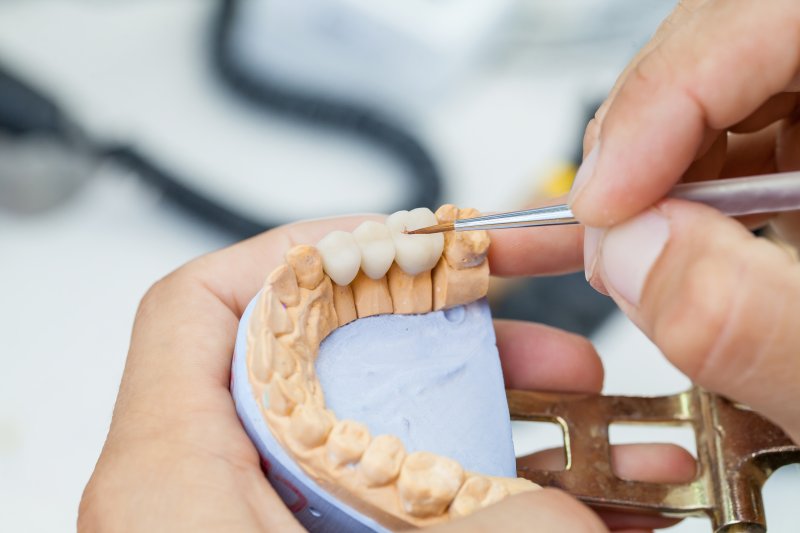A dental bridge can transform your smile and improve your ability to chew and speak, making it a valuable investment in your oral health. However, like any dental restoration, dental bridges in Leduc, AB, also need proper care to stay in good condition and last for many years. By following a few simple care tips, you can ensure your dental bridge remains functional and attractive.
Here’s a breakdown of how to keep your dental bridge in tip-top shape.
1. Prioritize Daily Oral Hygiene
One of the most important steps to preserving the life of your dental bridge is maintaining excellent oral hygiene. While the bridge itself is not prone to decay, the teeth supporting it, known as abutment teeth, and the surrounding gum tissue are still vulnerable to plaque buildup.
Brush Twice Daily
Use a soft-bristled toothbrush and fluoride toothpaste to clean your teeth thoroughly. Pay special attention to the area around the bridge to prevent plaque and food particles from accumulating.
Floss Underneath the Bridge
Traditional floss might not work due to the bridge’s structure, but special tools like floss threaders or water flossers can help you clean beneath the bridge and reach areas that may otherwise be missed.
Use Antibacterial Mouthwash
Rinsing with an antibacterial mouthwash can help keep harmful bacteria at bay, reducing your risk of gum disease and decay in the abutment teeth.
By staying consistent with your oral care routine, you can significantly extend the lifespan of your dental bridge.
2. Watch What You Eat
Your diet plays an essential role in protecting your dental bridge. While dental bridges are designed to handle everyday eating, certain habits and foods can pose risks.
Avoid Hard or Sticky Foods
Foods like hard candies, nuts, ice, and chewy caramels can place undue stress on your bridge, risking damage or loosening the restoration.
Stick to Balanced Meals
Choose foods that promote healthy teeth and gums, such as leafy greens, dairy products, and lean proteins. These nutrients help maintain the strength of your teeth and oral tissues, which support the bridge.
Limit Sugary and Acidic Snacks
Too much sugar or acidic foods can lead to decay in the abutment teeth or irritate your gums. Minimize sugary drinks and snacks, and opt for water or sugar-free alternatives instead.
Being mindful of your diet not only protects your dental bridge but also contributes to overall oral health.

3. Avoid Damaging Habits
Certain habits can wear down or damage your dental bridge over time. For example, grinding your teeth (a condition known as bruxism) can put excessive pressure on the bridge, causing it to become loose or crack.
Consider a Mouthguard
If you know you grind your teeth, especially at night, talk to your dentist about getting a custom mouthguard. It will help protect not only your bridge but also your natural teeth.
Use Your Teeth for Chewing Only
Avoid using your teeth, and by extension, your bridge, to open packages or bite hard objects. These habits can create unnecessary strain and lead to damage.
Breaking bad habits can go a long way toward keeping your bridge secure and functional for years to come.
4. Schedule Regular Dental Check-Ups
Routine dental visits are vital to monitoring the condition of your bridge and the surrounding teeth. During these check-ups, your dentist will ensure the bridge fits properly and is in good shape.
They’ll also clean hard-to-reach areas and check for potential problems, such as gum disease or decay in the abutment teeth. Catching issues early can save you time, money, and potentially more invasive procedures.
5. Address Problems Without Delay
If you experience issues with your dental bridge, such as looseness, discomfort, or visible damage, don’t wait to see your dentist. Prompt attention to these problems can prevent them from becoming more serious (and expensive) to address.
Always listen to your dentist’s advice and follow up promptly if you notice any changes or discomfort.
Conclusion
Caring for your dental bridge doesn’t have to be complicated, but it does require consistency. By maintaining good oral hygiene, eating carefully, avoiding harmful habits, visiting your dentist regularly, and addressing any concerns right away, you can keep your dental bridge in excellent shape for years to come.





